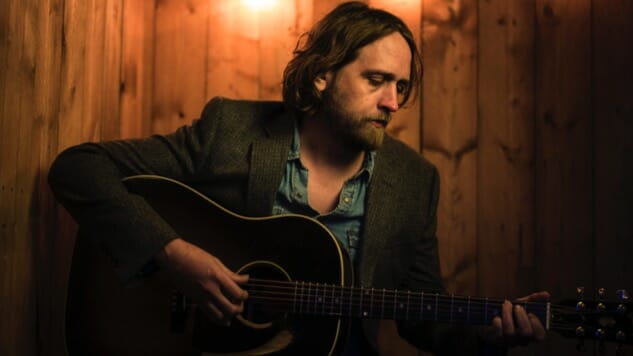Hayes Carll: Hitting the Road for the Sake of the Song

On his previous album, 2010’s KMAG YOYO, Hayes sang with self-mocking humor about the travails of the road. The song “Hard Out Here” poked fun at crowds that don’t listen, deals that aren’t straight and beer coolers that run out. “They say, ‘Boy, you ain’t a poet, just a drunk with a band,’” he sang with comic exaggeration over a bouncy Texas two step. “It gets hard out here, I know it don’t look it. I used to have heart but the highway took it.” It was a wonderfully funny and catchy song.
He’s not laughing now.
KMAG YOYO was Carll’s breakthrough album, landing in the top 20 of Billboard’s country and rock charts. Everyone expected a follow-up album of similarly witty, bouncy numbers within a year or a two. Instead no recordings emerged for five and a half years, as he wrestled with a painful divorce, a 40th birthday and fundamental questions about what kind of artist he wanted to be. He now says that both the divorce and the creative hiatus were caused—not entirely but in crucial ways—by the debilitating effects of life on the road. Moving forward, that’s one of the key aspects of his life that he wants to change.
“Getting divorced and turning 40 made me take a look at how I lived my life for the past 16 or 17 years,” he says. “I wasn’t happy with the way things were going. Part of that was the way I made my living. I was burned out and had lost the joy of performing music. A lot of times I had to drink a bottle of whiskey just to get through the show.
“You look up and say, ‘Gee, I’m in a different city every night; my relationship is a wreck; I’m not seeing my kid, and I’m waking up every day with a hangover.’ Don’t get me wrong; there are positive things too. I get to do what I’ve dreamed of doing since I was 14. I get to write songs and have an audience that wants to hear them. But there had to be a way to hang on to those positives without getting killed by the negatives.”
Carll is sitting in a corner booth in the back room at Threadgill’s Restaurant in South Austin, trying to keep his head down during the madness that is the South by Southwest Music Conference. His girlfriend Allison Moorer (Shelby Lynne’s sister, Steve Earle’s ex-wife and an accomplished singer/songwriter in her own right) has just squeezed Carll’s hand goodbye to go get ready for her guest appearance at his show that night. Wearing a blue-denim jacket over a gray shirt and sporting a modest light-brown beard, Carll speaks in a subdued voice, as if not relishing this rehash of his recent crises but determined not to duck any questions either.
He has reason to have confidence that things are going to get better, because his new album, Lovers and Leavers, coming out April 8, is the finest work of his career, even if it’s very different from what came before. It’s a quieter record, recorded mostly with a stripped-down trio—with occasional splashes of keys and steel added here and there. It’s a more thoughtful collection—with the choruses more likely to contain epiphanies than punchlines. Into the spaces where the stomping and joking once were comes a sobering awareness of the losses that shadow every life. That consciousness was always lurking in the background of his songs, but now it comes into the foreground.
“We recorded this record live in five days,” he writes in the liner notes, “using just an acoustic guitar, a mix of bass, percussion, pianos and organs, and a touch of pedal steel. I didn’t have one song that I knew would be a sing along or would make people dance. I felt vulnerable in a way that I hadn’t in a long time. But I got what I wanted—a record with space, nuance and room to breathe. It felt right for my art. It felt right for my life.”
It’s fitting that Lovers and Leavers opens with a road song: “Drive,” co-written with Jim Lauderdale. “Drive and drive, don’t you ever sleep?” Carll sings to himself over a two step so relaxed it lulls one into a reverie. In that dream, the singer sees himself forever on the road, clinging to the hope that as “long as you keep moving, you won’t ever die.” But it proves a false hope. In the final verse, the exhausted singer decides to “lay down by the railroad tracks.”
“It’s not just musicians who experience this,” Carll says at Threadgill’s. “Truckers, salesmen, a lot of people have jobs that keep them on the road a lot. After a while you begin to feel homeless and adrift. You look around, and all your friends have lives and families. I longed for a garden and a dog, but I couldn’t because I was never home enough to take care of them. I was gone 250 nights a year for 10 years.”
But here’s the conundrum: In 2016, the only way to make a living in music as a full-time front person is to travel. The days when Steely Dan could stay home and just make records, confident they would sell enough to provide a good income, belong to another century. Unless you’re in the pop-music one-percent, records rarely yield a substantial profit these days, so you have to hit the road. And music-making is such a powerful experience that singers will put up with a lot just for the chance to keep doing it—a fact that the music industry knows how to exploit.
-

-

-

-

-

-

-

-

-

-

-

-

-

-

-

-

-

-

-

-

-

-

-

-

-

-

-

-

-

-

-

-

-

-

-

-

-

-

-

-








































